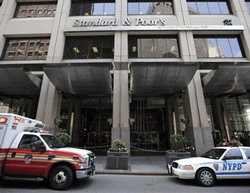
Standard & Poor's said it will face a lawsuit from the US government over its inaccurate ratings of mortgage-related investments in the run-up to the financial crisis, CNN reported.
The ratings agency said in a statement that the Department of Justice "has informed the company that it intends to file a civil lawsuit against S&P focusing on its ratings in 2007 of certain US collateralized debt obligations", investments based on pools of mortgages.
S&P called the potential lawsuit "entirely without factual or legal merit". The firm said it "deeply regrets" the fact that its ratings "failed to fully anticipate the rapidly deteriorating conditions in the US mortgage market". But it said it relied on the same data as US government officials and other analysts who failed to predict the housing bust.
The Department of Justice has not made any comment. S&P is a division of McGraw-Hill, shares of which dropped sharply on the news, closing down 13.8 percent. Shares of fellow ratings agency Moody's fell 10.7 percent. Moody's declined to comment, while a spokesman for Fitch, the other of the big three ratings agencies, told CNN the firm has "no reason to believe Fitch is a target of any such action".
Analysts have long pointed to ratings agencies as key culprits in the financial crisis. Wall Street firms and investors rely on the agencies to analyse risk and give debt a "grade" that reflects the borrower's ability to pay the underlying loans. The safest investments are rated "AAA".
In the years preceding the meltdown in 2008, large numbers of mortgage-backed securities received AAA ratings, only to fail as the housing market collapsed. Critics say that because the major ratings agencies are paid by banks and other issuers of securities rather than investors, they succumbed to a conflict of interest in giving their seals of approval to dubious investments.
"Credit rating agencies allowed Wall Street to impact their analysis, their independence and their reputation for reliability. And they did it for the money," CNN quoted US Senator Carl Levin as saying in a 2010 hearing. A 2011 Senate report on the financial crisis said the agencies "weakened their standards as each competed to provide the most favourable rating to win business and greater market share."
Deccan Herald is on WhatsApp Channels| Join now for Breaking News & Editor's Picks